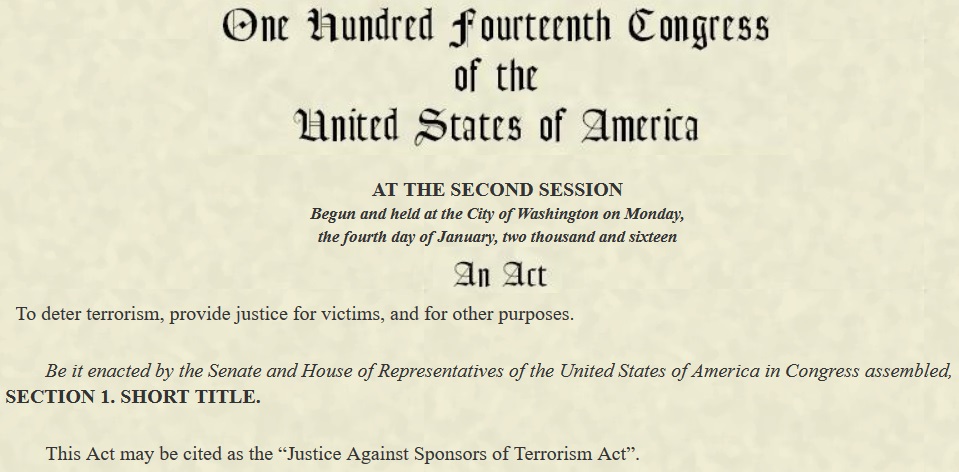
By David Zvirman, Staff Writer
Recently, there has been a lot of attention given to the Justice Against Sponsors of Terrorism Act (JASTA). This act is more commonly known in the media as the bill that would allow 9/11 victims to bring civil suits against Saudi Arabia for its alleged involvement in the attacks.[7] This bill was vetoed by President Barack Obama on Sept. 23, 2016.[8] The veto was then overridden by Congress on Sept. 28, 2016, with a vote of 97-1 in the Senate and 348-77 in the House.[9] While this issue brings up a lot of mixed emotions, we need to get past the media sound bites to see it from both sides.
The bill itself is not long and makes for a straightforward read. The summary of the bill from Congress’s website describes its contents as amendments to the federal judicial and federal criminal code.[2] These amendments allow U.S. courts to hear cases involving claims against foreign states for injuries suffered as a result of terrorist attacks that occur within the U.S.[2] It also allows federal courts to have personal jurisdiction over cases that involve acts of international terrorism against Americans.[2]
Based on this information, it sounds like the bill would not incur much debate. Taking those responsible for terrorist attacks to court seems like a good idea. The debate around JASTA, however, is not so much about the bill itself but about the implications and consequences that its passage would or would not cause.
Those supporting the bill, like its sponsors Sen. John Coryn (R-TX) and Sen. Chuck Schumer (D-NY),[7] have quite a few key arguments. First, they say it would allow victims of 9/11 to get justice against those who are responsible for 9/11.[1] It would also allow victims of other terrorist attacks to pursue justice against nations that involve themselves with terrorism against the U.S.[1]
Second, they also argue that this bill is not a radical change, as there are already limitations on diplomatic immunity, and this would only be used in events where foreign nations are sponsoring or aiding terrorism on U.S. soil.[6] They point to the exact verbiage of the bill, which does state that it is to only be used in such cases.[3]
Finally, supporters argue that this bill would not be damaging to American foreign policy, as it only affects nations that sponsor terrorism. They argue that nations that do not sponsor terror will have no reason to fear this bill.[6]
On the other side, opponents of this bill raise a few arguments of their own. First, many, including Obama and Director of the CIA John Brennan, argue that this would undermine how the U.S. does foreign policy.[1] They argue that this bill would circumvent the normal procedures where national governments single out nations that sponsor terror, not individual citizens.[6]
Second, they argue that it may hurt American government officials abroad.[1] This argument stems from the idea that if the U.S. moves to limit diplomatic immunity for foreign governments and their officials to allow for civil litigation, other countries may enact similar laws in response; this can be potentially harmful to American interests and personnel.[1]
Finally, they argue that it would directly hurt our alliance with Saudi Arabia, as it is the main target of the bill.[5] Saudi Arabia is a key regional ally in the Middle East and in the fight against terrorism, and alienating it would run counter to the War on Terror.[5]
This is only a brief summary of the arguments on both sides, but it shows that there is more to this issue than 9/11 victims getting justice. There are possible consequences, both good and bad, that must be weighed. Hopefully, this article sheds some light on the issue and will lead to you to doing your own research and making your own conclusions based on facts and not headlines.
Sources
[1] Saudi Arabia and 9/11: Enter the lawyers, 2016 WLNR 29854386, Economist 66 (2016).
[2] https://www.congress.gov/bill/114th-congress/senate-bill/2040
[3] https://www.congress.gov/bill/114th-congress/senate-bill/2040/text
[4] http://www.nytimes.com/2016/09/29/us/politics/senate-votes-to-override-obama-veto-on-9-11-victims-bill.html?_r=0
[5] https://www.govtrack.us/congress/bills/114/s2040/summary#
[6] http://www.nytimes.com/2016/09/24/us/politics/obama-veto-saudi-arabia-9-11.html?_r=1
[7] http://www.reuters.com/article/us-saudi-usa-congress-idUSKCN0Y8239
[8] http://www.cnn.com/2016/09/23/politics/september-11-bill-saudi-arabia-veto/
[9] http://www.npr.org/2016/09/28/495709481/sept-11-lawsuits-vote-today-could-be-first-reversal-of-an-obama-veto